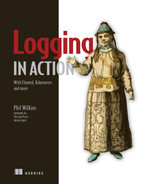0%
28Chapters
0-1Hours read
0kTotal Words
Logging in Action teaches you to record and analyze application and infrastructure data using Fluentd. Using clear, relevant examples, it shows you exactly how to transform raw system data into a unified stream of actionable information. You’ll discover how logging configuration impacts the way your system functions and set up Fluentd to handle data from legacy IT environments, local data centers, and massive Kubernetes-driven distributed systems. You’ll even learn how to implement complex log parsing with RegEx and output events to MongoDB and Slack.
Table of Contents
- inside front cover
- Logging in Action
- Copyright
- contents
- front matter
- Part 1. From zero to “Hello World”
- 1 Introduction to Fluentd
- 2 Concepts, architecture, and deployment of Fluentd
- Part 2. Fluentd in depth
- 3 Using Fluentd to capture log events
- 4 Using Fluentd to output log events
- 5 Routing log events
- 6 Filtering and extrapolation
- Part 3. Beyond the basics
- 7 Performance and scaling
- 8 Driving logs with Docker and Kubernetes
- 9 Creating custom plugins
- Part 4. Good logging practices and frameworks to maximize log value
- 10 Logging best practices
- 11 Logging frameworks
- Appendix A. Installation of additional tools and services
- Appendix B. Processing times and dates, regular expressions, and other configuration values
- Appendix C. Plugins summary
- Appendix D. Real-world use case
- Appendix E. Useful resources
- index
- inside back cover
